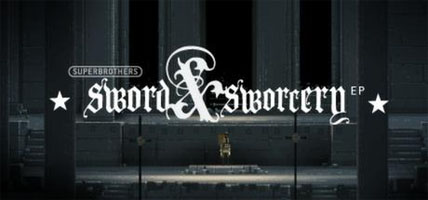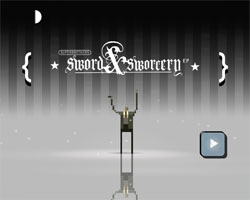

developed by Superbrothers and Capybara Games (Toronto, Ontario, CA)
first released March 24, 2011, for iPad, $4.99
[PC version trailer]
[website]
[soundtrack]
Played to 100% completion in 4 hours, 6/23/15–6/24/15.
[complete ~1.5 hour playthrough in 6 segments]
In the afternoon of Thursday, May 31, 2012, I received an announcement email about “Humble Indie Bundle V,” which contained five games, of which I was already genuinely interested in about four. I immediately purchased it for a full $10, feeling that I had gotten more than my money’s worth from the previous bundles and ought to take the “pay what you think is right” thing seriously. Also, I was employed at the time so didn’t feel quite as frightened as usual about spending money.
The five games, in the order they appeared on the website, were: Superbrothers: Sword and Sworcery EP, which I did not touch until just now; LIMBO, which I played and enjoyed soon afterward; Amnesia: The Dark Descent, which I’ve started up once (very nervously) but only played for a few minutes; Psychonauts, which I had already played in its entirety on the PS2 back in 2005, but was happy to purchase in PC form so that I could easily return to it or push it on other people; and Bastion, which I have as yet not played at all.
This entry has already been written and deleted twice, in full. The game is thoroughly “hipster,” and that’s a subject that can send me off on long, tortured jags. I’m committed to writing these entries in one go and not agonizing, but I really didn’t like what I was putting out there in either of the previous drafts, so here I am yet again.
I think my mistake was launching straight into “analysis” instead of just trying to convey my experience, letting any analysis arise organically as a tool to that end. That might not be an obvious distinction to the reader, but I think it works out to be something the reader benefits from.
My experience of Superbrothers: Sword and Sworcery EP was that there was something very tasty and worthwhile here, which I kept trying to bring to the center of my palate, but that there was also the gristle of hipsterism in every bite, preventing the underlying flavor from ever coming into its own. There is a lovely cucumber soup implicit in the fantasy forest twilight ambiance, in the exquisite pixel-art graphics and corresponding dreamy music… and then the soup is given just a little extra hipster zing by the addition of a few lardons, croutons, oyster crackers, jalapeno flakes, pizza bites, chocolate-covered edamame, Corn Pops, and also fuck it how about some dirt, ’cause, you know, “soup,” what’s that all about? #thatmomentwhen
Case study: the title. This is a game about a good old mythical quest in a mythical forest, hence “sword and sorcery.” This has been tweaked to “sword and sworcery” in an attempt to lay better claim to the phrase on the game’s own terms, but note that this a deliberately doofy in-quotes pun, one of the staples of hipster argot. (Subtext: “Remember being so simple and innocent as to still make puns? How delicious that was. But make no mistake: we’re sophisticates now, burdened with full censorious awareness of how asinine puns are. Our former innocence is actually an embarrassment. Ha ha we’re making light of it.”)
So far OK, but there’s more. Sword and Sworcery is being presented as though a game is like a rock album. At its core this is a very old idea, going back to Electronic Arts in 1983, but these guys want to be newly fetishistic about it. We know that Sword and Sworcery is an album because it has the “band name,” Superbrothers, shoehorned right into the title. And then the coup de grace: what kind of album is this? Any hipster worth his lardons can tell you that of course it has to be a vinyl EP. And that this, too, needs to be articulated outright in the title to get full credit for it.
Dealing with the string of words Superbrothers: Sword and Sworcery EP exactly encapsulates the player experience in dealing with the game. The various affectations cut against each other and create an anxious little blur of overkill. It’s headache-inducing and erodes the core aesthetic experience.
But here’s where I feel an uneasy ambivalence. The hipster ideology is that this, this itchy, sweet/salty/umami/Trix teary-eyed/tongue-in-cheek overintellectualized/faux-naif fetishistic/sentimental post-postmodern pile-up — which corresponds to their internal psychological pile-up — this is a legitimate aesthetic experience… and I have to admit, they’ve got me there. The artistic answer to “Will it blend?” is always “yes.” The question is really whether the audience wants to stomach it. I can only speak for myself.
I guess my thing with hipsters is that their psyches have been subjected to a sickening Bass-O-Matic process that has utterly intermingled their anxious defense mechanisms with their authentic souls. Then they come to me with these weird slurried hearts and try to interest me in their weird slurried art, and I’m both fascinated and nauseated. I feel like Geena Davis in The Fly listening in horror to disintegrating Jeff Goldblum go on about how spiritual and great it is, what’s happening to him. Um, it doesn’t seem great. #butwhatdoiknow
This game was designed for iPad and only later ported to PC, but without really reworking the touchpad control scheme, which, with a mouse, doesn’t feel particularly intuitive or sensible. This can’t have helped my impression.
I could go on but I think better I don’t. The bottom line is, there is a lovely forested dreamspace in this game, and I was touched by it, some, when I wasn’t fighting against the many currents of convoluted affectation. The game tells us, laboriously and invasively, that it is based on Jungian archetypes. I’m always up for exploring my inner archetypal imagery; less so for being told that that’s what I’m doing. The cigar-smoking psychiatrist figure who introduces each segment of the game is clumsily identified as “The Archetype” — rather than as, say, “The Jungian” — which seems to me like an (inadvertent?) admission that the hipster mind is a hall of mirrors. The ostensible analytic framework is itself just another projection, one that happens to muck up the dream and diminish its pleasures.
If only games were peelable, I would peel this one and love just the seed. But alas I can’t.
And I can’t heal the artists by loving the art more than I do. This is important to remember. It’s just me here.
This game is a damned shame. Given that, I liked it. But that’s a lot to be given.
Craig D. Adams (“Superbrothers”) (concept, art, design, writing)
Kris Piotrowski (design, “project leadership”)
Jim Guthrie (music, sound)
Jon Maur (technical programming)
Frankie Leung (gameplay programming)